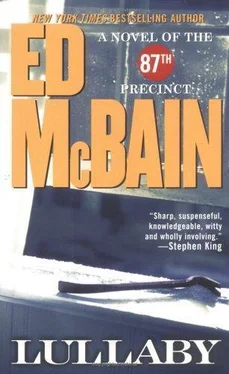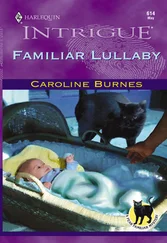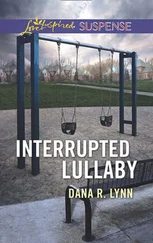Ed McBain - Lullaby
Здесь есть возможность читать онлайн «Ed McBain - Lullaby» весь текст электронной книги совершенно бесплатно (целиком полную версию без сокращений). В некоторых случаях можно слушать аудио, скачать через торрент в формате fb2 и присутствует краткое содержание. Жанр: Полицейский детектив, на английском языке. Описание произведения, (предисловие) а так же отзывы посетителей доступны на портале библиотеки ЛибКат.
- Название:Lullaby
- Автор:
- Жанр:
- Год:неизвестен
- ISBN:нет данных
- Рейтинг книги:3 / 5. Голосов: 1
-
Избранное:Добавить в избранное
- Отзывы:
-
Ваша оценка:
- 60
- 1
- 2
- 3
- 4
- 5
Lullaby: краткое содержание, описание и аннотация
Предлагаем к чтению аннотацию, описание, краткое содержание или предисловие (зависит от того, что написал сам автор книги «Lullaby»). Если вы не нашли необходимую информацию о книге — напишите в комментариях, мы постараемся отыскать её.
Lullaby — читать онлайн бесплатно полную книгу (весь текст) целиком
Ниже представлен текст книги, разбитый по страницам. Система сохранения места последней прочитанной страницы, позволяет с удобством читать онлайн бесплатно книгу «Lullaby», без необходимости каждый раз заново искать на чём Вы остановились. Поставьте закладку, и сможете в любой момент перейти на страницу, на которой закончили чтение.
Интервал:
Закладка:
Lullaby
By Ed McBain
Scanned & Proofed By MadMaxAU
* * * *
Introduction
In suggesting that we package Lullaby, Vespers, and Widows in one volume, I recall thinking that these three novels were of a piece, a seamless trilogy that marked a particularly dark time in the annals of the 87th Precinct. Whether or not this coincided with a somewhat bleak era inthe history of New York City is a matter for conjecture. Isola, of course, is not New York - regarding which a note of explanation may be necessary.
When Pocket Books, Inc. first approached me about doing a mystery series back in 1955, I told them I felt the only valid people to investigate crimes were cops. Not private eyes, not attorneys, not rabbis or priests, certainly not cats, or little old ladies who belonged to the garden club and solved murder mysteries in their spare time - but cops. C-O-P-S, cops. I told them I wanted to write realistically about cops in New York City. Cops with wives or husbands, boyfriends or girlfriends, families, flaws, even head colds. They gave me a contract for three books - 'to see how it goes' - and I started researching and writing the books. The only difference between what I'd discussed and what finally came out of the typewriter was the substitution of a mythical city for New York.
I did this for several very practical reasons, least of which was trying to keep up with the constantly changing rules and regulations of the NYPD. More important, cops needed to know names, addresses, and telephone numbers. If I used a real city, I was risking the possibility of innumerable lawsuits. Isola is fictitious. So are the people and places in it. (The phone numbers, too.) Happily, the mythical city turned out to be a creative plus. I could invent geographical locations that did not exist, and I could invent histories for those places. I could have fun. Anyway, whenever you read a novel set in, let's say Denver, Colorado, and the writer tells you there's a gigantic tower in the center of that city, how would you know whether that tower really exists if you'd never been there? I've never been to Iowa or Idaho; for me, either of those places is only as real as the writer makes it.
For me, Isola is very real.
Even so, New York was undeniably going through some bad times during 1989,1990, and 1991 when these three novels were written. It was a time of random crimes, perps killing victims they didn't even know. It was a time of enormous anger, otherwise polite individuals flaring up in outraged indignation if you happened to brush against them on the street or - God forbid! - snatched a taxicab they thought they'd hailed. It was a time when pedestrians constantly checked their perimeters to make certain they were not about to be ambushed. It was a time when citizens began to distrust, and law enforcement officers began to despair.
It is no accident that the crimes in this trilogy are particularly uncivilized. They seem to speak of a resurgence of, if not evil - which is, after all, a theological concept - then certainly mercilessness. You do not kill an infant. You do not kill a priest. But more than that, in these three novels even the men and women of the Eight-Seven seem to be in extraordinary peril. Civilization, you know, is premised on laws we've constructed and enforced over the centuries. When we break those laws, we threaten the very fabric of society itself. And when the people authorized to enforce those laws are themselves the ones being threatened, the danger is multiplied exponentially. It is as if the last bastions of civilization are under assault. It is as if, finally, we are facing anarchy.
However . . .
Doomsday ain't quite here yet, folks.
All is not lost.
Despite the dark tone of these novels, there is still decency and honor and dedication, and there is humor (I hope) and there is love (I most certainly hope) and there is a promise of better times ahead.
Enjoy.
Ed McBain Weston,
Connecticut
* * * *
1
Both detectives had children of their own.
The teenage baby-sitter was about as old as Meyer's daughter. The infant in the crib recalled for Carella those years long ago when his twins were themselves babies.
There was a chill in the apartment. It was three o'clock in the morning and in this city most building superintendents lowered the thermostats at midnight. The detectives, the technicians, the medical examiner, all went about their work wearing overcoats. The baby's parents were still dressed for the outdoors. The man was wearing a black cloth coat and a white silk scarf over a tuxedo. The woman was wearing a mink over a long green silk gown and high-heeled green satin pumps. The man and the woman both had stunned expressions on their faces. As if someone had punched them both very hard. Their eyes seemed glazed over, unable to focus.
This was the first day of a bright new year.
The dead sitter lay sprawled on the floor midway down the hallway that ran the rear length of the apartment. Baby's bedroom at the far end, off a fire escape. Tool marks on the window and sill, they figured this was where he'd come in. Mobile with a torn cord lying on the floor beside the crib. Monoghan and Monroe stood looking down at the dead girl, their hats settled low on their heads, their hands in the pockets of their overcoats. Of all the men in the room, they were the only two wearing hats. Someone in the department once said for publication that the only detectives who wore hats in this city were Homicide detectives. The person who'd said this was a Homicide detective himself, so perhaps there was some truth to the ancient bromide. In this city, Homicide detectives were supposed to supervise each and every murder investigation. Perhaps this was why they wore hats: to look supervisory. By department regulations, however, a murder case officially belonged to the precinct catching the squeal. Tonight's double murder would be investigated by detectives in the local precinct. The Eight-Seven. Detectives Meyer Meyer and Steve Carella. Lucky them.
The ME was crouched over the teenager's body. Monoghan guessed he would tell them any minute now that the girl was dead from the knife sticking out of her chest. Monoghan had been called out from a party. He was still just drunk enough to find all of this somehow comical. Dead girl on the floor here, blouse torn, skirt up around her ass, knife in her chest. A lapis pendant on a broken gold chain coiled like a blue-headed snake on the floor beside her. Monoghan looked down at the ME and smiled mysteriously. Monroe was cold sober, but he found all of this a little comical, too, perhaps because it was New Year's Day and in this rotten business if you didn't laugh and dance away all your troubles and cares-
'She's dead,' the ME said.
Which made it official.
'Shot, right?' Monoghan asked, and smiled mysteriously.
The ME didn't bother answering him. He snapped his satchel shut, got to his feet, and then walked into the living room, where Carella and Meyer were still trying to get some answers from the baby's dazed parents.
'We'll do the autopsies soon as we can,' he said, and then, in explanation, 'The holidays. Meanwhile you can say one was stabbed and the other was smothered.'
'Thanks,' Meyer said.
Carella nodded.
He was remembering that years and years ago, whenever he got up in the middle of the night to feed the twins, he would hold one in his arms and prop the other's bottle on the pillow. Alternated the routine at the next feeding. So that one of them would always be held.
There was a dead baby in the bedroom at the far end of the hall.
'Mrs Hodding,' Meyer said, 'can you tell me what time you got back here to the apartment?'
Gayle Hodding. Blonde and blue-eyed, twenty-eight years old, wearing eye shadow to match the green gown, no lipstick, the dazed expression still on her face and in her eyes. Looking at Meyer blankly.
Читать дальшеИнтервал:
Закладка:
Похожие книги на «Lullaby»
Представляем Вашему вниманию похожие книги на «Lullaby» списком для выбора. Мы отобрали схожую по названию и смыслу литературу в надежде предоставить читателям больше вариантов отыскать новые, интересные, ещё непрочитанные произведения.
Обсуждение, отзывы о книге «Lullaby» и просто собственные мнения читателей. Оставьте ваши комментарии, напишите, что Вы думаете о произведении, его смысле или главных героях. Укажите что конкретно понравилось, а что нет, и почему Вы так считаете.












